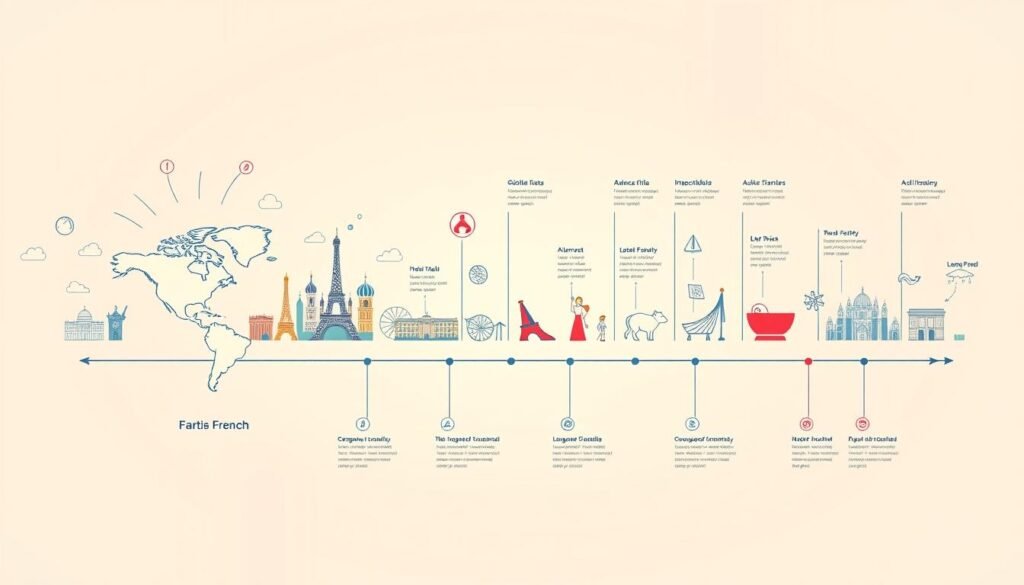Have you ever wondered what it truly takes to master the French language? Whether you’re a beginner or someone looking to refine your skills, the journey to fluency is both exciting and rewarding. With the right strategies, consistent effort, and a clear goal, you can make significant progress in less time than you might think.
We believe that every person’s language learning journey is unique. By focusing on active speaking and immersion, you can achieve conversational fluency in as little as 9-12 months. Our expert guidance, rooted in years of teaching experience, ensures you stay motivated and on track.
Setting a clear goal from the start is crucial. Whether you aim to become a confident speaker or simply want to enjoy the beauty of the French language, consistency is key. With daily practice and the right resources, you’ll find that fluency is within your reach.
Key Takeaways
- Conversational fluency is achievable in 9-12 months with consistent effort.
- Setting a clear goal is essential for staying motivated.
- Active speaking and immersion strategies accelerate progress.
- Expert guidance can help you navigate challenges effectively.
- Daily practice, even in small amounts, leads to significant improvement.
Understanding the Journey to French Fluency
Mastering the French language is a journey filled with discovery and growth. Fluency goes beyond textbook grammar; it’s about expressing ideas, telling stories, and engaging in natural conversations. We believe that understanding what true fluency means is the first step toward achieving it.
Defining Fluency and Its Importance
Fluency in French isn’t just about memorizing vocabulary or mastering verb conjugations. It’s about feeling confident in everyday interactions, whether you’re ordering at a café or discussing your favorite book. Conversational fluency involves storytelling, active listening, and the ability to adapt to different contexts.
For example, a fluent speaker can effortlessly switch between formal and informal language, depending on the situation. This level of skill comes from consistent practice and a deep understanding of cultural nuances.
Key Influencing Factors in Language Learning
Several factors determine how quickly you can achieve fluency. Your native language plays a role, especially if it shares similarities with French. Prior experience with other languages can also accelerate your progress.
Daily commitment is another critical factor. Even dedicating 20 minutes a day to active speaking or listening can make a significant difference. We encourage learners to focus on survival vocabulary—essential words and phrases that empower you to navigate real-life situations.
Setting measurable short-term goals is equally important. Whether it’s mastering greetings or holding a 5-minute conversation, these milestones keep you motivated. Remember, embracing mistakes and seeking feedback are vital for growth.
How Long Does It Take to Learn French: What to Expect
Understanding the timeline for mastering French can help set realistic goals. We believe that knowing the time commitment required for each proficiency level empowers learners to stay motivated and focused. By breaking down the process into manageable steps, you can create a study plan that aligns with your personal goals.

CEFR and FSI Time Estimates Reviewed
The Common European Framework of Reference for Languages (CEFR) and the Foreign Service Institute (FSI) provide valuable insights into the time required to achieve fluency. For example, reaching the A1 level typically takes 70-80 hours of study, while B2 proficiency requires 540-620 hours.
According to FSI estimates, an immersive approach can lead to conversational fluency in approximately 9-12 months. These timelines are based on structured classroom hours and consistent self-study. We encourage learners to use these benchmarks as a guide while recognizing that individual progress may vary.
Realistic Timelines Based on Experience
Every person’s journey to fluency is unique. Factors like your native language, prior experience, and daily commitment play a significant role. For instance, dedicating 20 minutes a day to active speaking or listening can yield noticeable progress over time.
It’s important to address common misconceptions about quick fluency. While some programs promise rapid results, true proficiency requires consistent effort. We recommend setting short-term milestones, such as mastering greetings or holding a 5-minute conversation, to stay motivated.
Ultimately, the key to success lies in daily practice and immersion. Whether you’re studying for an hour a day or engaging in immersive experiences, consistency is your greatest ally in mastering the French language.
Practical Strategies for Your French Learning Journey
Building fluency in French requires more than just studying; it’s about practical application. We believe that combining structured learning with real-world practice accelerates progress. By focusing on active engagement and immersion, you can achieve conversational fluency faster.
Active Speaking and Immersion Techniques
One of the most effective methods for mastering French is through active speaking. Engaging in one-on-one tutoring or conversation exchanges with native speakers helps you practice real-world scenarios. Immersion sessions, such as watching French movies or listening to podcasts, also enhance comprehension and retention.
We recommend alternating between structured lessons and spontaneous conversations. This approach ensures you understand grammar rules while developing the confidence to speak naturally. Immersion abroad, if possible, can further deepen your understanding of cultural nuances.
Developing a Survival Vocabulary
Building a strong foundation starts with mastering essential words and phrases. Flashcards, like those from Langua, are a proven method for rapid vocabulary acquisition. Focus on survival vocabulary—terms that empower you to navigate everyday situations.
Consistent practice is key. Dedicate 15-30 minutes daily to reviewing new words and using them in sentences. Linking vocabulary to images or feelings, rather than direct translations, improves memory retention. Over time, this method helps you think in French, reducing the need for mental translation.
We encourage you to experiment with different techniques to find what works best for you. Whether it’s gamified apps, community resources, or intensive online classes, the right method can make all the difference.
Factors That Influence Your Learning Speed
Your journey to mastering French is shaped by several key factors. These elements determine how quickly you can progress from a beginner to a confident French speaker. By understanding these influences, you can tailor your approach for better results.

Personal Background and Motivation
Your native language plays a significant role in learning French. For example, speakers of Romance languages like Spanish or Italian often find it easier due to shared grammar and vocabulary. Previous experience with other languages can also accelerate your progress.
Motivation is another critical factor. Learners who set clear goals and stay committed tend to achieve fluency faster. We’ve seen students make significant progress in just a few months by dedicating 20 minutes a day to practice.
Learning Methods and Daily Commitment
The method you choose can greatly impact your learning speed. One-on-one tutoring often yields faster results than group classes, as it allows for personalized feedback. Self-study tools, like flashcards or apps, can also be effective when used consistently.
Daily commitment is essential. Even a small amount of time spent practicing can lead to noticeable improvement. For instance, a beginner who studies for 15 minutes daily can build a strong foundation within a few weeks.
We encourage you to experiment with different methods and find what works best for you. Whether it’s structured lessons or immersive experiences, the right approach can make all the difference.
Setting Goals and Crafting Your Study Plan
Crafting a clear study plan is the foundation of mastering any language. We believe that setting specific, achievable goals is the first step toward fluency. A well-structured plan not only keeps you motivated but also ensures steady progress.
Establishing Short-Term Milestones
Short-term milestones are essential for building momentum. Start with simple objectives, like mastering basic greetings or holding a 5-minute conversation. These small wins boost confidence and keep you engaged in the learning process.
We recommend tracking your progress by numbering these milestones. For example, aim to learn 10 new words each week or complete a beginner-level course within a month. This method provides a clear roadmap and helps you stay focused.
Designing a Long-Term Strategy for Proficiency
Long-term success requires a balanced approach. Combine structured lessons with immersive experiences to deepen your understanding of the language. For instance, enroll in a class while also practicing with native speakers or watching French movies.
We encourage you to dedicate time daily, even if it’s just 20 minutes. Consistency is key to achieving fluency. Over a year, these small efforts add up, leading to significant improvement in your language skills.
Remember, a well-crafted plan accelerates both knowledge acquisition and overall fluency. By setting clear goals and following a structured method, you’ll find that mastering French is within your reach.
Conclusion
Mastering the French language is a rewarding journey that combines time, effort, and the right strategies. We believe that every person can achieve fluency by staying consistent and embracing the process. Whether you’re a beginner or refining your skills, setting clear goals is essential.
Realistic timelines show that conversational fluency can be reached in 9-12 months with daily practice. Immersion techniques, active speaking, and building a survival vocabulary are proven methods to accelerate progress. Even dedicating 20 minutes a day can lead to significant improvement over time.
Your motivation and study habits play a crucial role in this journey. Celebrate small milestones, like mastering greetings or holding a short conversation. These steps build confidence and keep you moving forward.
We encourage you to stay committed and trust the method. Every hour spent practicing brings you closer to fluency. Together, we can make this journey both effective and enjoyable.
FAQ
What is the importance of defining fluency in French?
Defining fluency helps set clear goals and measure progress. It ensures you focus on practical communication skills rather than just grammar or vocabulary.
What factors influence the speed of learning French?
Your native language, daily commitment, motivation, and learning methods significantly impact how quickly you achieve proficiency.
How does the CEFR framework estimate time to learn French?
The CEFR provides structured levels (A1 to C2) with estimated hours for each. For example, reaching B2 typically requires 500-600 hours of study.
What are realistic timelines for learning French?
With consistent effort, beginners can achieve basic conversational skills in 3-6 months. Full fluency often takes 1-2 years or more, depending on dedication.
How can immersion techniques accelerate French learning?
Immersion, such as speaking with native speakers or consuming French media, enhances comprehension and builds confidence in real-world scenarios.
What is a survival vocabulary, and why is it important?
A survival vocabulary includes essential words and phrases for daily interactions. It’s crucial for beginners to communicate effectively in basic situations.
How does motivation affect the learning process?
Strong motivation keeps you consistent and focused. It helps overcome challenges and maintain progress toward your language goals.
What are short-term milestones in learning French?
Short-term milestones, like mastering greetings or ordering food, provide measurable achievements that keep you motivated and track your progress.
How do I design a long-term strategy for French proficiency?
A long-term strategy includes setting clear goals, scheduling regular practice, and incorporating diverse learning methods like classes, apps, and immersion.
Can I learn French faster with structured courses?
Yes, structured courses provide a clear roadmap, expert guidance, and consistent practice, which can significantly speed up the learning process.






